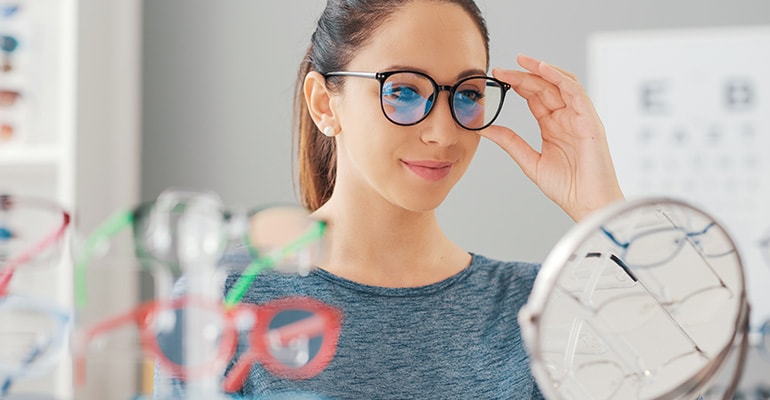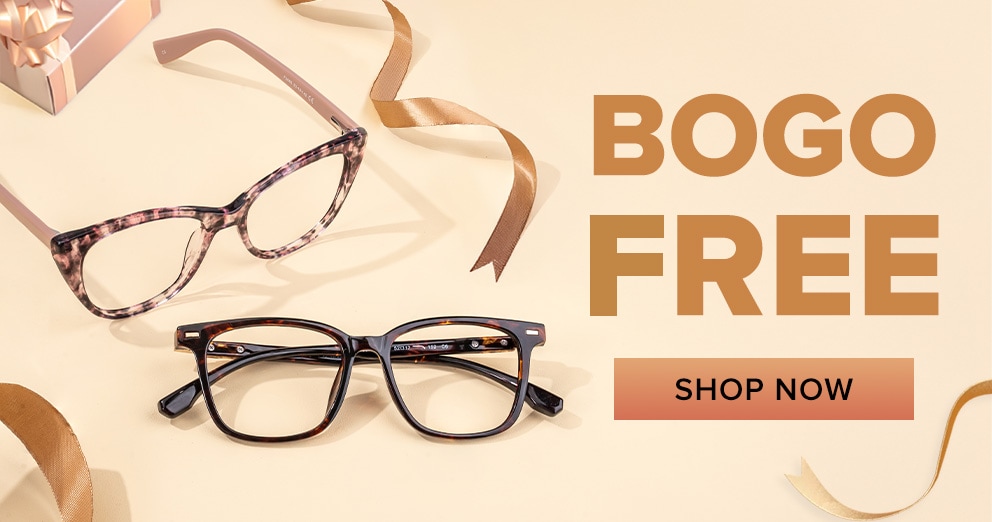What Prescription Is Legally Blind? - Our Guide
Jul 18, 2024
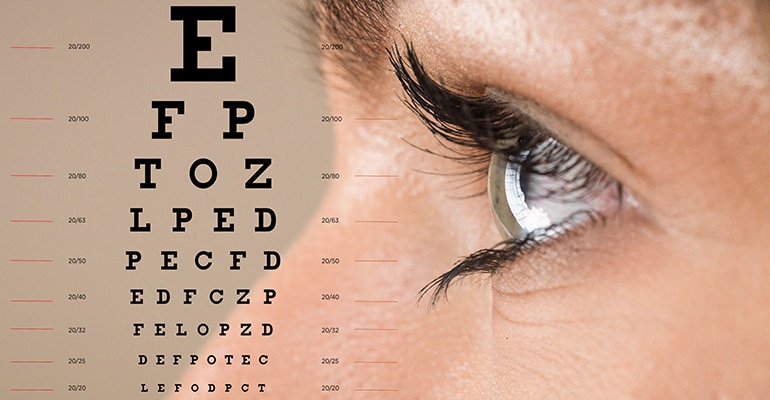
Lots of people assume being legally blind means you can’t see anything at all, but this isn’t exactly true. Some people who have a legally blind prescription can see the light and objects, just not that clearly, only around 15% of people with eye disorders are considered ‘completely blind’.
However, knowing if you're legally blind or not is extremely important since it determines whether you're eligible for benefits such as tax exemptions or Social Security disability benefits. It's also a deciding factor on whether or not you have a driving license.
Find out in our guide below exactly what prescription is legally blind, the criteria for meeting a legally blind vision prescription, the causes of being legally blind, and some protection tips to help look after your vision.
What Is Legally Blind Vision?
First things first, let’s understand exactly what being legally blind means, including the exact legally blind prescription and definition to know if your vision meets legally blind criteria.
Key Factors For Determining Legal Blindness
Two main factors come into play when determining if your prescription is legally blind; visual acuity and visual field.
- Visual acuity - This means the clarity of your vision, if your vision is 20/200 this means to see an object from a distance of 200 feet away you would need to be at least 20 feet away from it - making you legally blind
- Visual field - This means you can have better vision than 20/200, but if your visual field is less than 20 degrees you are also considered legally blind.
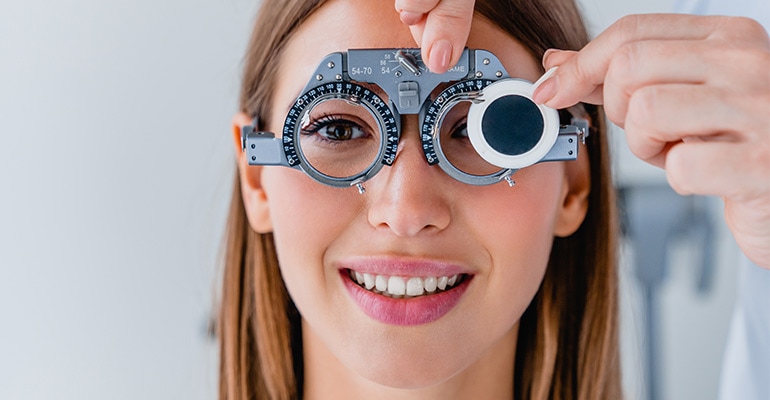
What Prescription Is Legally Blind?
To know if you are legally blind you can look at your glasses or contact lens prescription. Typically, if your prescription number is below -2.5, you are classed as legally blind since you need to be standing much closer to an object to see it clearly than someone with regular vision.
Legally Blind Definition
The certified legally blind definition from SSA is the ‘‘best corrected visual acuity of 20/200 or less in the better-seeing eye and the visual field (VF) limitation such that the widest diameter of the visual field subtends an angle no greater than 20 degrees.’’
According to WHO, legal blindness is when you have a visual acuity of less than 20/400 or a visual field of fewer than 10 degrees even with a glasses prescription for legally blind vision.
How Do You Know If You Are Legally Blind?
To get an accurate diagnosis that you are legally blind, we suggest a visual acuity test from your opticians. To do this, your optician will likely use the Snellen eye chart which will mean you will only be able to read the top line of the chart even when wearing corrective glasses to be classed as legally blind.
For visual field testing your optician will cover one eye at a time and test if you can see fingers when held up in the different quadrants of your vision field while keeping your vision centered ahead. This is also known as a confrontational visual field exam.
Most Common Causes Of Legal Blindness
There are a few different conditions that have been linked to the onset of legal blindness; Glaucoma, Diabetic Retinopathy, age-related macular degeneration, and injuries.
- Age-related macular degeneration - This is a problem with your retina which typically happens over the age of 50. It either happens when the macular becomes too thin, known as dry AMD, or wet AMD which happens when abnormal vessels grow under the retina. This rapid vision loss when left untreated can lead to becoming legally blind.
- Glaucoma - A result of too much pressure in your eye, leading to damage of your optic nerves and potential legal blindness. This happens when fluid gets trapped underneath the eye, there is no singular cause.
- Diabetic Retinopathy - Caused by high blood sugar from diabetes, diabetic retinopathy causes the blood vessels in the eye to swell and leak. Left uncontrolled it can cause someone to become legally blind.
- Eye Injuries/Genetic conditions - Usher syndrome can also cause legal blindness which is genetic. Eye injuries from sports or labor jobs when eye protection is not worn can cause blindness too.
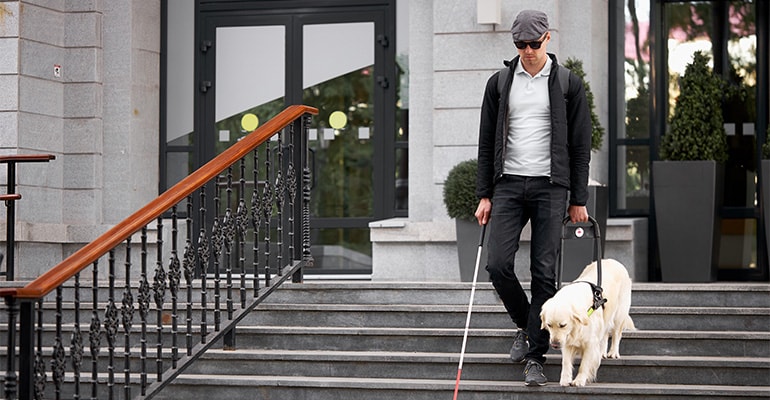
What Support Is Available To The Legally Blind?
If you are legally blind or know someone who is, there are support systems available from governments and certain equipment or hands that help in day-to-day life to make things easier with limited vision.
- Equipment - Bright lights, canes, magnifiers, screen readers, large print keyboards, and liquid level indicators can all be little help for people who are legally blind so they can be as independent as possible in daily life.
- Guide dogs - Guide dogs can help legally blind people achieve easier mobility and independence since they help recognize obstacles, find things, use transport, and have safety awareness.
- Support groups - There are many support groups where you can talk about challenges, make friends, and get support in visually impaired support groups.
- Vision rehabilitation - This rehab can be effective in trying to help people learn to live with vision loss and be independent.
Legally Blind Support Through Social Security Benefits
If you are classed as having a legally blind prescription, you may be eligible to receive some social security benefits. Through this, you can get rehabilitation services, compassionate allowances, disability benefits, and even tax exemptions. This is known as Social Security Disability Insurance and Supplemental Security Income.
How To Protect Your Eyes From Becoming Blind
Sometimes, becoming legally blind can just be down to genetics or age, but there are some things you can do to protect your eyes and reduce the chances of getting poor vision.
- Keep your blood sugar levels in check - Legal blindness from diabetes is considered 90% preventable.
- Eat a healthy diet - Eat plenty of veggies and high-nutrition meals to support your eyesight. High omega-3 foods like fatty fish are linked to better eyesight.
- Keep a healthy weight - Overweight people are more at risk of developing diabetes, which therefore can damage their eyesight.
Protect Your Eyes With GlassesShop - Order Your Glasses Today
Of course, another key factor in keeping your eyes healthy is protecting them with sunglasses to help block out harmful UV light during sunny days. At GlassesShop, we have a huge variety of sunglasses to help with eye protection which can be customized to your taste. We also stock prescription eyeglasses to help correct visual impairment in the early stages with customized lenses such as single vision, bifocal, reading, and progressive lenses depending on your needs.
GlassesShop also has a buy one get one free deal, a 30-day exchange policy, and a 365-day guarantee to protect your purchase. You can see our full range of prescription glasses here.
